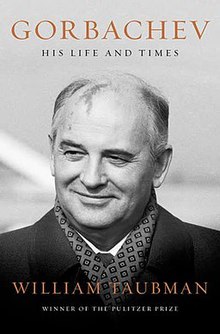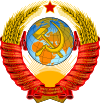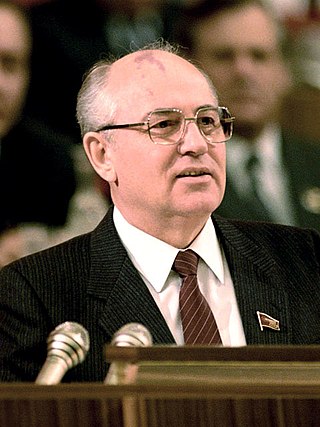
Mikhail Sergeyevich Gorbachev was a Soviet and Russian politician who served as the last leader of the Soviet Union from 1985 to the country's dissolution in 1991. He served as General Secretary of the Communist Party of the Soviet Union from 1985 and additionally as head of state beginning in 1988, as Chairman of the Presidium of the Supreme Soviet from 1988 to 1989, Chairman of the Supreme Soviet from 1989 to 1990 and the President of the Soviet Union from 1990 to 1991. Ideologically, Gorbachev initially adhered to Marxism–Leninism but moved towards social democracy by the early 1990s.
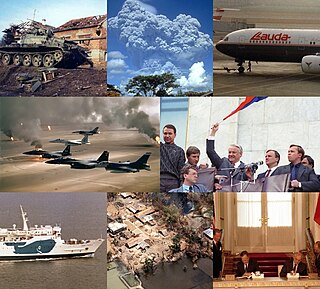
1991 (MCMXCI) was a common year starting on Tuesday of the Gregorian calendar, the 1991st year of the Common Era (CE) and Anno Domini (AD) designations, the 991st year of the 2nd millennium, the 91st year of the 20th century, and the 2nd year of the 1990s decade.

Lynne Cox is an American long-distance open-water swimmer, writer and speaker. She is best known for being the first person to swim between the United States and the Soviet Union, in the Bering Strait, a feat which has been recognized for easing the Cold War tensions between U.S. President Ronald Reagan and Soviet leader Mikhail Gorbachev.

The time period of around 1985–1991 marked the final period of the Cold War. It was characterized by systemic reform within the Soviet Union, the easing of geopolitical tensions between the Soviet-led bloc and the United States-led bloc, the collapse of the Soviet Union's influence in Eastern Europe, and the dissolution of the Soviet Union in 1991.

William Chase Taubman is an American political scientist. His biography of Nikita Khrushchev won the Pulitzer Prize for Biography in 2004 and the National Book Critics Circle Award for Biography in 2003.

Jack Foust Matlock Jr. is an American former ambassador, career Foreign Service Officer, teacher, historian, and linguist. He was a specialist in Soviet affairs during some of the most tumultuous years of the Cold War, and served as the U.S. Ambassador to the Soviet Union from 1987 to 1991.

Relations between the Soviet Union and the United States were fully established in 1933 as the succeeding bilateral ties to those between the Russian Empire and the United States, which lasted from 1776 until 1917; they were also the predecessor to the current bilateral ties between the Russian Federation and the United States that began in 1992 after the end of the Cold War. The relationship between the Soviet Union and the United States was largely defined by mistrust and tense hostility. The invasion of the Soviet Union by Germany as well as the attack on the U.S. Pacific Fleet at Pearl Harbor by Imperial Japan marked the Soviet and American entries into World War II on the side of the Allies in June and December 1941, respectively. As the Soviet–American alliance against the Axis came to an end following the Allied victory in 1945, the first signs of post-war mistrust and hostility began to immediately appear between the two countries, as the Soviet Union militarily occupied Eastern European countries and turned them into satellite states, forming the Eastern Bloc. These bilateral tensions escalated into the Cold War, a decades-long period of tense hostile relations with short phases of détente that ended after the collapse of the Soviet Union and emergence of the present-day Russian Federation at the end of 1991.
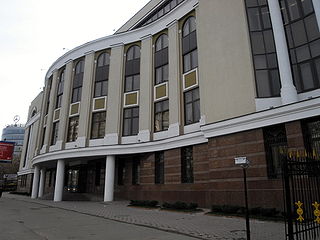
The Gorbachev Foundation is a non-profit organization headquartered in Moscow, founded by the former Soviet leader Mikhail Gorbachev in December 1991 and began its work in January 1992. The foundation researches the Perestroika era, as well as issues of Russian history and politics. It was financed by Gorbachev and donations by people and companies.

India and the Soviet Union had cooperative and friendly relations. During the Cold War (1947–1991), India did not choose sides between the Capitalist Bloc and the Communist Bloc and was a leading country of the Non-Aligned Movement (NAM). Relations ended in 1991 with the dissolution of the Soviet Union.

The history of Soviet Russia and the Soviet Union (USSR) reflects a period of change for both Russia and the world. Though the terms "Soviet Russia" and "Soviet Union" often are synonymous in everyday speech, when referring to the foundations of the Soviet Union, "Soviet Russia" often specifically refers to brief period between the October Revolution of 1917 and the creation of the Soviet Union in 1922.

Khrushchev: The Man and His Era is a 2003 biography of Soviet leader Nikita Khrushchev. Written by William Taubman, the book is the first in-depth and comprehensive American biography of Khrushchev. Taubman was the recipient of the 2004 Pulitzer Prize for Biography or Autobiography, as well as the 2004 National Book Critics Circle Award. The author spent almost 20 years researching the life of Khrushchev in preparation to write the book. Extensive research was made possible through access to archives in Russia and Ukraine, which were opened to the public following the collapse of the Soviet Union. In addition to printed materials and documentation, he spent time engaging Khrushchev's children and extended relatives, resulting in over 70 personal interviews. Taubman presents a historical narrative and study of the life of Nikita Khrushchev, the Soviet leader who succeeded Joseph Stalin. The book concludes with Khrushchev's death on September 11, 1971.
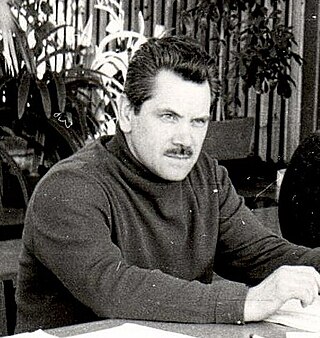
Anatoly Sergeevich Chernyaev was a Russian politician and writer, member of the Central Committee of the Communist Party of the USSR, who became foreign-policy advisor to General Secretary Mikhail Gorbachev in 1986-1991.

Raisa Maximovna Gorbacheva was a Soviet-Russian activist and philanthropist who was the wife of Soviet leader Mikhail Gorbachev.
On 7 January 1989, Ruhollah Khomeini, supreme leader of Iran, sent a letter to Mikhail Gorbachev, the General Secretary of the Soviet Union. This letter was Khomeini's only written message to a foreign leader. Khomeini's letter was delivered by the Iranian politicians Abdollah Javadi-Amoli, Mohammad-Javad Larijani, and Marzieh Hadidchi. In the letter, Khomeini declared that communism was dissolving within the Soviet bloc, and invited Gorbachev to consider Islam as an alternative to communist ideology.
The Mikhail Gorbachev presidential campaign, 1996 was an electoral campaign effort by former President of the Soviet Union and General Secretary of the Communist Party of the Soviet Union Mikhail Gorbachev in the 1996 Russian presidential election. Gorbachev's candidacy was beset by the obstacles of both minimal media coverage and a high level of disdain towards him amongst the Russian populace. Gorbachev's candidacy ended in defeat during the first round of the election. The effort was the first, and only, electoral campaign of Gorbachev's post-Soviet political career.

The 19th All-Union Conference of the Communist Party of the Soviet Union was a party conference held by the Communist Party of the Soviet Union from 28 June to 1 July 1988. The conference was attended by 4,991 delegates.

The controversy in Russia regarding the legitimacy of eastward NATO expansion relates to the aftermath of the Revolutions of 1989, when the fall of Soviet-allied communist states to opposition parties brought European spheres of influence into question. U.S. documents claim that agreement on non-expansion of NATO to Eastern Europe took place orally and the alliance violated it with its expansion while the leaders of the alliance claim that no such promise was made and that such a decision could only be made in writing. Soviet President Mikhail Gorbachev, who participated in the 1990 negotiations, subsequently spoke out about the existence of a "guarantee of non-expansion of NATO to the east" inconsistently, confirming its existence in some interviews and refuting in others. Among academic researchers, opinions on the existence or absence of a non-extension agreement also differ.

On 30 August 2022, Mikhail Gorbachev, the eighth and final leader of the Soviet Union from 1985 to 1991, died after a long illness at the Moscow Central Clinical Hospital in Russia. Gorbachev was the last living Soviet leader following the death of Georgy Malenkov in 1988, was the only one to have been born during the Soviet Union's existence, and the only one to have died after its dissolution. At the age of 91 years old, Gorbachev is the longest-lived ruler of Russia to date, having lived longer than Alexander Kerensky and Vasili Kuznetsov, who both died at 89 years old. On 3 September, a funeral was held for Gorbachev, and he was buried later that day.
